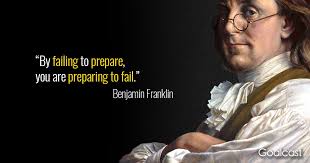
The art of Virtue – behavior showing high moral standards. A virtue is a trait or quality that is deemed to be morally good and thus is valued as a foundation of principle and good moral being. In other words, virtues are behaviors that show high moral standards: doing what is right and avoiding what is wrong.
Benjamin Franklin, inventor, statesman, writer, publisher and economist relates in his autobiography that early in his life he decided to focus on arriving at moral perfection. He made a list of 13 virtues, assigning a page to each. Under each virtue he wrote a summary that gave it fuller meaning. Then he practiced each one for a certain length of time.
Ben Franklins 13 Virtues
- Temperance – Habitual moderation in the indulgence of the appetites or passions. Moderation in or abstinence from the use of alcoholic beverages.
- Silence – Forbearance from speech or noise. Absence of sound or noise.
- Order – To arrange, to place in order.
- Resolution – The act of analyzing a complex notion into simpler ones.
- Frugality – The quality or state of being frugal. Careful management of material resources and especially money.
- Industry – Manufacturing activity as a whole. A distinct group of productive or profit-making enterprises.
- Sincerity – The quality or state of being sincere: honesty of mind: Freedom from hypocrisy.
- Justice – The process or result of using laws to fairly judge and punish crimes and criminals.
- Moderation – Avoiding extremes of behavior or expression: Observing reasonable limits.
- Cleanliness – The quality or state of being clean: The practice of keeping oneself or one’s surroundings clean.
- Tranquility – The quality or state of being tranquil – free from agitation of mind or spirit. Free from disturbance or turmoil.
- Chastity – The quality or state of being chaste: Purity in conduct and intention. Restraint and simplicity in design or expression. Personal integrity.
- Humility – Freedom from pride or arrogance: The quality or state of being humble – not proud: Not thinking of yourself as better than other people.
How Ben Franklin Documented His Virtue Habits
To make these virtues a habit, Franklin came up with a method to grade himself on his daily actions. In a journal he drew a table with a row for every virtue and a column for every day of the week. Every time he made a fault, he made a mark in the appropriate column. Each week he focused his attention on a different virtue. Over time, through repetition, he hoped to one day experience the pleasure of “viewing a clean Book.”
He says that he carried out this personal examination for years. In order to do the work thoroughly he decided to attempt each virtue and a quarter of its importance – one at a time. He began with temperance, which included the moderating of every pleasure or inclination to develop undesirable habits, because temperance “tends to procure that coolness and clearance and head that is so necessary where constant vigilance is to be kept up and guard maintained against the unremitting attraction of ancient habits and the force of perpetual temptations.”
The other virtues practice in succession by Franklin were silence, order, resolution, frugality, industry, sincerity, Justice, moderation, cleanliness, tranquility, chastity and humility. For the summary order he followed a little scheme of employing his time each day. From five to seven each morning he spent in bodily personal attention, saying a short prayer, thinking over the day’s business and resolutions, studying and eating breakfast. From eight till twelve he worked at his trade. From twelve to one he read or overlooked his accounts and dined. From two to five he worked at his trade. The rest of the evening until 10 he spent in music, or diversion of some sort.
This time is used also to put things in their places. In the last thing before retiring was examination of the day. At the age of 79, he ascribed his health to temperance; the acquisition of misfortune to industry and frugality; the confidence of his country to sincerity and justice.
Apply Study and Commitment to Your Virtues
Take some time and write down your Virtues. By writing down your Virtues it will help you to focus on the values that are important for you in your career and your life.
Your virtues reflect the values you were raised by, values you may have learned from mentors. Understanding and embracing your virtues will show your integrity during your interview as well as during your career as a firefighter.
You can’t fake your virtues. Say you have strong virtues or more commonly known as values is one thing, but if these values are not apart of how you live your life, it often become easy to spot. Telling the interview panel what you think they want to hear, versus telling them what you believe and live by are two very different things.
Franklin’s extraordinary success in life and politics can be attributed to his perseverance to overcome his personal liabilities, and his desire to constantly become better.
Next time you really want to achieve something, take time to focus on your own personal journal. What is your temptation that is standing in your way to greatness? What can you do to form the habit of becoming a success?
